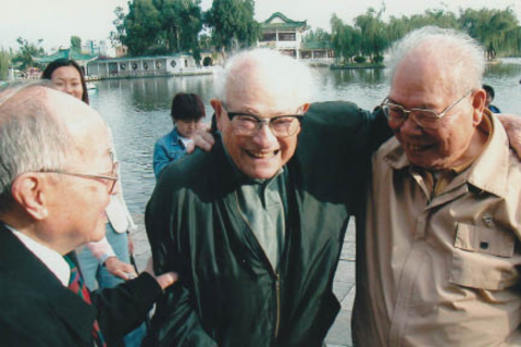On the 35th Anniversary of China-U.S. Diplomatic Relations
As a journalist, I traveled extensively throughout the States. I seldom needed to find my own accommodation as old friends would invite me to stay with them, urging me to make myself at home. Some were former members of the U.S. 14th Air Force, also known as the Flying Tigers, whose mission was to defend China against Japanese invasions. My association with them began in Kunming, where the crew was stationed during World War II while I was still an undergraduate.
When I visited Edward Bell, one of my Flying Tiger friends in New York, he even gave me the keys to his house, telling me, “This is your house now, so feel free to come and go as you please.” Edward also proudly introduced me to his neighbors, saying, “This is my lifelong friend from China!” One afternoon I went to visit another friend who unexpectedly invited me to go to a movie and have dinner afterwards. I did not get back to Edward’s house until 11.00 p.m. When I opened the door he asked me angrily, “Where have you been? I’ve been so worried!” Afraid there had been an emergency, Edward had called several hospitals and even a few police precincts in case I had met with a car accident. On hearing this, I felt ashamed at having caused him anxiety, but at the same time was greatly moved at this expression of brotherly affection beyond borders.
Dick Pastor, another friend from the Flying Tigers, had devoted himself to improving U.S.-China friendship. Although of advanced years, Dick yearned to revisit China someday. But his physicians advised him, in view of his age and physical frailty, not to take this long journey. Determined to go, however, Dick underwent recuperative care. Six months later he and his 90-year-old wife returned to Kunming. I was among the Chinese friends that came to meet the couple. We had a wonderful time recalling the good times of 60 years earlier. Dick is well-known throughout Kunming, and our children and grandchildren all take pride in maintaining this friendship.
|
 |
| Dick Pastor (middle) revisits Kunming 60 years after he was deployed in the city as one of the Flying Tigers. |
Apart from old friends, new acquaintances also often lent me a hand. The U.S.-China Peoples Friendship Association (USCPFA) is a nationwide organization formed before the two countries established diplomatic relations. It has branches across the country, and its members have a deep interest in China. When I went on business trips, those living locally would often pick me up at airports and accommodate me in their homes. They became my close friends and local guides, and also enriched my understanding of the U.S. and its culture.
On one occasion right before the Christmas holiday I needed to do an interview in a suburban district a hundred miles away. The sole person on duty that day at the USCPFA branch took my call. I apologized for asking for help during the holiday season, but she seemed not to mind, and immediately promised to give me a ride. The following morning, Tese Wintz, the lovely 24-year-old woman I had spoken to, appeared at my door. She first drove me to interview the chairman of the United Farm Workers of America (UFWA), who lived deep in a forest. We then went to visit some farm owners who were opposed to the UFWA. Tese and I had plenty of time to chat on a wide range of topics on the way, and we became good friends after that trip. Years later, she became an expert in Chinese and Asian studies, and taught in a university. She came to China to work as a language consultant on China Pictorial at my invitation, and later taught English in Peking University. Tese has since been a close family friend, and always stays with us whenever she visits Beijing.
There are countless new friends like Tese in my life. Another good friend of mine was Jordan Phillips, a doctor of obstetrics. He and his wife came to China in the 1970s, right after the “cultural revolution.” Dr. Phillips found that China was suffering a critical shortage of medical textbooks and equipment. Also that healthcare at that time was lamentably backward. In addition to sharing his ideas and professional experience with the Chinese medical community, Dr. Phillips called on U.S. medical education institutions to donate textbooks and equipment to Chinese medical schools and libraries. A committee was set up specifically to organize this activity. For more than a decade, the couple annually traveled between the two countries at their own expense to oversee the operation. Upon arriving in Beijing, their first phone call was always to me. In 1991 Dr. Phillips received the China Health Award in recognition of his significant contributions. During WWII, Canadian doctor Norman Bethune came to China to tend the wounded on the frontline. The Chinese people refer to my friend Dr. Phillips as “the American Dr. Bethune.”
